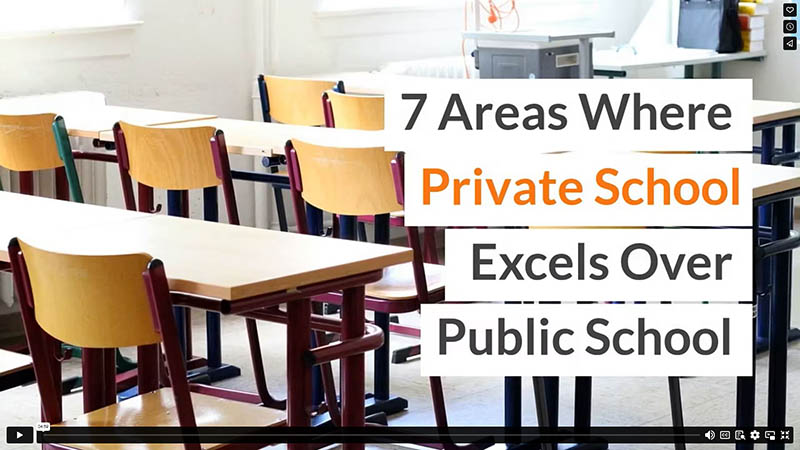Private schools can seem hopelessly out of reach for those seeking a better education for their kids while struggling to put food on the table. That’s because private school tuition averages $17,000 a year.
In recent years, however, many private schools have pivoted to offer more grants, scholarships, and other tuition assistance to attract bright, young students from diverse socioeconomic backgrounds. In addition, several states have passed legislation for independent school voucher programs, and changes in the tax law now allow educational savings account funds (529 plans) to be used for K-12 expenses.
These changes, and a growing crop of enterprising and affordable schools, like The Academy of Scholars in Atlanta, are making private education more accessible than ever before. But it may still seem much easier (and cheaper) to leave your child in the public education system. Is getting your kid into private school really worth all the hassle?
As longtime educators and parents, we believe the answer to that question is a resounding “Yes!” and here are some reasons why:
Higher Academic Standards
It’s no big secret that private school children typically score better on standardized college entrance exams and have a higher high school graduation rate than public school students. While independent schools must maintain the same minimum academic achievement standards as public ones, they have more freedom to focus on providing individualized instruction and a greater variety of high-level course content.
Increased Parental Involvement
Parents want to know what their kids are learning, how they’re being taught, and the challenges they face at any given time. They also like being able to address concerns directly with school leadership rather than battling bureaucratic brick walls. By their very nature, private institutions will be more receptive to parental input because of their responsibility to satisfy you, the customer.
In addition, independent schools are usually a lot smaller than public schools, which enables parents to get involved in more direct ways, such as organizing a fundraiser for their son’s drama club or assisting the school’s robotics professor in grading papers. This consistent and open interaction can also bring parents into the discussion more quickly when serious issues like bullying or poor academic performance arise.
Accelerated Learning to Match Student Ability
Students often misbehave or tap out if the classroom curriculum isn’t challenging. Private educators can move a child into an advanced class if they show early grade-level mastery. In addition, for-profit independent schools typically have increased funding to invest in cutting-edge technology and resources that better engage students.
Smaller Class Sizes and Individualized Instruction
For 2019 through 2020, the National Center for Education Statistics (NCES) reports that the student-to-teacher ratio for private schools stood at 11.4 to 1 versus around 16 to 1 for public schools. The numbers also indicate that since 2010, private schools have typically had four to five fewer students per teacher. Having fewer kids in the classroom allows teachers to get to know their students and hone in on their strengths, weaknesses, and learning styles.
Safer Learning Environment
Parents often cite school safety as one of their top concerns because they understand that kids can’t learn if they’re constantly worried about violence. Unfortunately, school violence is on the rise, and the bulk of these incidents take place in government-run schools.
Recent research shows that private school students feel more secure than their public school peers. One study by Harvard’s M. Danish Shakeel and Corey A. DeAngelis at the Cato Institute concluded that children attending private schools were considerably less affected by bullying, robbery and theft, school violence, and gang-related activity. They also tended to be more respectful of teachers and administrators and had fewer class behavior issues.
Focused Instruction Options
Independent schools offer various educational formats designed to inspire children to pursue their passions and instruct them in the ways they learn best, rather than using the one-size-fits-all model prevalent in public learning.
Do you have a daughter who’d rather be doing anything other than listening to a teacher’s lecture? Consider a private school with an entrepreneurship program or other hands-on, engaging curriculums. For example, our private Christian school in Atlanta introduces kids to coding at an early age to get them excited about the world of computers and what they can do with them.
Maybe your child learns better in an online environment. Some online private schools offer the same variety of curriculum choices virtually as they do in person, allowing students access to quality education from anywhere.
Teacher Training and Subject Matter Expertise
There is something to be said about having a former Microsoft computer programmer teaching kids the basics of coding. Or, perhaps, a retired Naval physicist introducing electricity and motion to a bunch of fourth-graders. While Georgia’s non-public schools do not require educators to hold teacher certification, they do require bachelor’s, and sometimes master’s, degrees or several years of teaching experience.
Again, flexibility reigns supreme in the private sector, where top-rated private institutions often hire teachers with stellar academic credentials and extensive professional experience in their fields. Who better to bring a subject to life than someone who has lived it?
If you think in-person or online private school is something you want to explore for your child, click here to contact us.
Infographic
Private schools often provide students with additional resources, including access to state-of-the-art technology, equipment, and facilities. In addition, many private schools have lower student-to-teacher ratios than public schools so that teachers can give more individualized attention and instruction in the classroom. Classes in private schools can have as few as eight or nine students, which lets teachers give more individualized lessons.

Video

